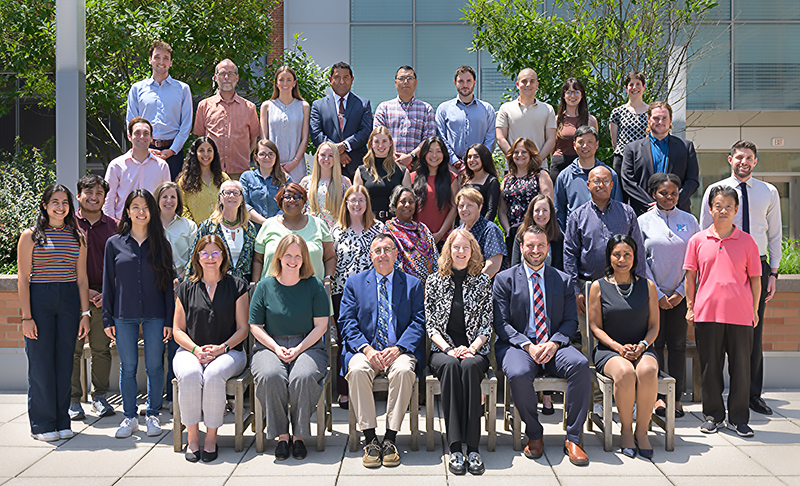Meet the Team


Dr. Carlos A. Zarate, Jr., MD
Chief, Experimental Therapeutics and
Pathophysiology Branch
Dr. Carlos A. Zarate, Jr., M.D., is an NIH Distinguished Investigator and Chief of the Experimental Therapeutics and Pathophysiology Branch. He earned his medical degree from the Catholic University of Cordoba in Argentina. He completed a clinical psychopharmacology fellowship at McLean Hospital in 1993 and remained on staff until 1998. In 1998, Dr. Zarate joined the faculty at the University of Massachusetts Medical School. In 2001, Dr. Zarate joined the Mood and Anxiety Disorders program at the NIMH and, in 2009, formed the Experimental Therapeutics and Pathophysiology Branch (ETPB). A multidisciplinary translational research team conducts the research in the ETPB. The Branch also provides training to develop the next generation of clinical translational researchers.
Research Interests
Dr. Zarate's current research focus is on the neurobiology of severe mood disorders and developing novel medications for treatment-resistant depression, bipolar disorder, and suicide. His areas of expertise include biological and pharmacological aspects of mood disorders in adults. The ETPB conducts neurobiological and proof-of-concept studies utilizing novel compounds and biomarkers (magnetoencephalography and polysomnography, positron emission tomography, functional MRI and magnetic resonance spectroscopy) to identify potentially relevant mechanisms, drug targets and biosignatures of treatment response. Dr. Zarate has published more than 430 papers on these topics.
Honors & Awards
His achievements and awards include the Ethel-DuPont Warren Award and Livingston Awards, Consolidated Department of Psychiatry, Harvard Medical School, 1993-1994; NIH-NIMH Travel Award, 1994; American College of Neuropsychopharmacology Travel Awards, 1994 and 1995; Program for Minority Research Training in Psychiatry, American Psychiatric Association, 1996; the National Alliance for Research on Schizophrenia and Depression Young Investigator Award, 1996-1998; Young Investigator Bipolar Disorder Andrew P. Merrill Memorial Fund 1995-1997; Outstanding Psychiatrist Research Award, Massachusetts Psychiatric Association, 1997; Honorable Mention APA/SmithKline Beecham Young Faculty Award, 1999; the Diversity and Advocacy Award, Hispanic Research Initiative Committee, NIMH, 2002; Clinical Center Director’s Award/National Institutes of Health: Quality of Work life/Diversity, 2002; Clinical Teacher of Honor, National Institutes of Health, 2004; the Mentor of the Year, Intramural Research Program, NIMH, 2004; the Supervisor of the Year, NIMH, 2005; the National Alliance for Research on Schizophrenia and Depression Independent Investigator Award, 2005; the NIH Director’s Award-Scientific/Medical, 2007; NIMH Directors Award, 2009; the Brain & Behavior Research Foundation Award for Bipolar Mood Disorder Research (NARSAD), 2011; Mogens Schou Research Award: Bipolar Disorder, International Society for Bipolar Disorder, 2013; Top 10 Major Discoveries by NARSAD Grantees, Next Generation Therapies: Bipolar Disorder, Fast-Acting Antidepressants, 2014; Ruth L. Kirschstein Mentoring Award NIH, 2015; Astute Clinical Lecture Award, Clinical Center NIH, 2015; APF Simon Bolivar Award American Psychiatric Association, 2015; Top 10 Advancements & Breakthroughs, Brain & Behavior Research Foundation (NARSAD), Next-Generation Treatments: Suicide, Depression, 2016; Frank O. Shobe Lecture Grand Rounds, Washington University in St. Louis, 2016; William and Helen Guynn Lectureship, Dept of Psychiatry Grand Rounds, UTHealth McGovern Medical School, Houston Texas, 2018; National Institute of Mental Health Director’s Outstanding Mentor Award, 2018; NIH Distinguished Investigator, 2019; Dolores Shockley Minority Mentoring Award, ACNP, 2019; Member, National Academy of Medicine, 2020; Wagner-Jauregg Medal (ÖGPB) of the Austrian Society of Neuropsychopharmacology and Biological Psychiatry, 2020; Gerald L. Klerman Senior Investigator Award, 2021; George Heninger Lecture, Grand Rounds, Yale University, 2022; Distinguished Scientist Lecture, University of Pittsburgh Dept. of Psychiatry, 2022; and “How Science Has Offered Hope for Treatment-Resistant Depression”, White House virtual conversations to highlight promising areas of current research, 2022, National Institute of Drug Abuse (NIDA) Director’s Award, 2022; Owl of Wisdom Award, 7th Congress on Neurobiology, Psychopharmacology and Treatment Guidance Thessaloniki, Greece, 2022; Highly Cited Researcher Cross-field. Top 1% by citations for field and year in Web of Science, 2023; 16th annual Philip S. Chen Jr, PhD Distinguished Lecture on Innovation and Tech Transfer, 2023; NIMH Director’s Outstanding Mentor Award, 2023; NCATS Director’s Award: Boundary-Crossing Partnerships 2024; Fellow, National Academy of Inventors, 2024; American College of Psychiatrists Mood Disorders Award, 2025.
At its annual meeting for 2020, the National Academy of Medicine (NAM) announced the election of 90 regular members, including the National Institute of Mental Health (NIMH)’s Carlos Zarate Jr., M.D. One of the highest honors in the fields of health and medicine, election to the Academy recognizes outstanding professional achievement and commitment to service.
Carlos Zarate, Jr., M.D was honored with the title of NIH Distinguished Investigator. This title is reserved for NIH’s most preeminent Senior Investigators and requires a special peer review and approval by the NIH Director.
Carlos Zarate, Jr., M.D is past President of the American College of Neuropsychopharmacology (ACNP) and to Council of the International College of Neuropsychopharmacology (CINP).
Elizabeth Ballard, Ph.D. – Associate Scientist, Director, Psychology and Behavior Research and Director of Predoctoral Training in the Experimental Therapeutics and Pathophysiology Branch
Jennifer Evans, Ph.D. - Staff Scientist, Director of MRI Research in the Experimental Therapeutics and Pathophysiology Branch
Jessica Gilbert, Ph.D. – Staff Scientist, Director of MEG Research in the Experimental Therapeutics and Pathophysiology Branch
Mark Kvarta, M.D., Ph.D. – Staff Clinician, Director, Outpatient Mood Disorders Clinic and Chief of Stress Pathophysiology in the Experimental Therapeutics and Pathophysiology Branch
William T. Regenold, MDCM – Medical Director of the Noninvasive Neuromodulation Unit of the Experimental Therapeutics and Pathophysiology Branch
Staff
Ebtehal Al Shami, MS, Contractor
Neuroscience
Morgan Andrews, PhD, Contractor
Psychology
Solaleh Azimipour, MS, Contractor
Psychology
Timothy Barton
Software Development
Charles R. Bender
Biology
Yamila Carmona, MA, Contractor
Psychology
Carlos R. Cortes, MD, PhD, Contractor
Neuroimaging
Diane Dillard, LICSW
Social Work, Psychiatry
Lauren Durland, LCSW-C, Contractor
Social Work, Mental Health
Cristan Farmer, PhD
Psychology, Statistics
Tina Harris
Clinical Operations
Nadia Hejazi, MD
Neurology, Circadian Biology
Kelly Hurst, PhD Psychology
Psychology
Adilah M. Kirton BSN, RN-BC, Contractor
Mental Health
Victoria Liberty, BSN, RN
Nursing
Alex Noury, M.A.
Regulatory
Yemisi Olurebi, MS, Contractor
Regulatory, Data Management
Emily Page RN, FNP-BC
Psychiatry, Nursing
Shiyong Peng, PhD
Molecular Biology
Martiz Peterson
Administrative Management
Karna Robinson, MPH
Database Management
Maureen Tobin, BA
Psychology
Laura Waldman, LCSW
Social Work, Mental Health
Audrey Weinberg
Statistician, Data Management
Yumi Yi, CRNP
Psychiatry, Nursing
Peixiong Yuan, PhD
Molecular Biology
Brad Zoltick, MA
Computer Engineering, Neuroimaging Data Processing
Post-Doctoral and Clinical Fellows
Adam Fijtman, MD, PhD
Psychiatry
Hiroe Imai Hu, DO
Psychiatry
Greg Jones, MD
Psychiatry
Jenessa Johnston, PhD
Stem Cell Modeling, Molecular Biology
Samika Kumar, PhD
Neuroimaging
Steven Lamontagne, PhD
Electrophysiology, Suicide
Yoojin Lee, PhD
Neuroimaging, Suicide
Shrey N. Patel, MD
Psychiatry
Aryan N. Tafreshi, MD
Psychiatry
Nefize Yalin MD, PhD, MRCPsych
Bipolar Disorders, Neuroimaging
Neil Baker, BS
Neuroscience
Owen Brown, BS
Neuroscience
Benjamin H. Chandler, BS
Neuroscience, Psychology
Christine (Cece) Chang, BS, BA
Neuroscience, Psychology
Randall (Sky) Jones, Medical Student
Medical Research Scholar Program
Poulomi Mitra, BS
Neuroscience
Rachel Rans, BS
Psychology
Jessica Sloane, BS
Psychology, Philosophy
Aidan Wade, BS
Neuroscience, Addictions Counseling

